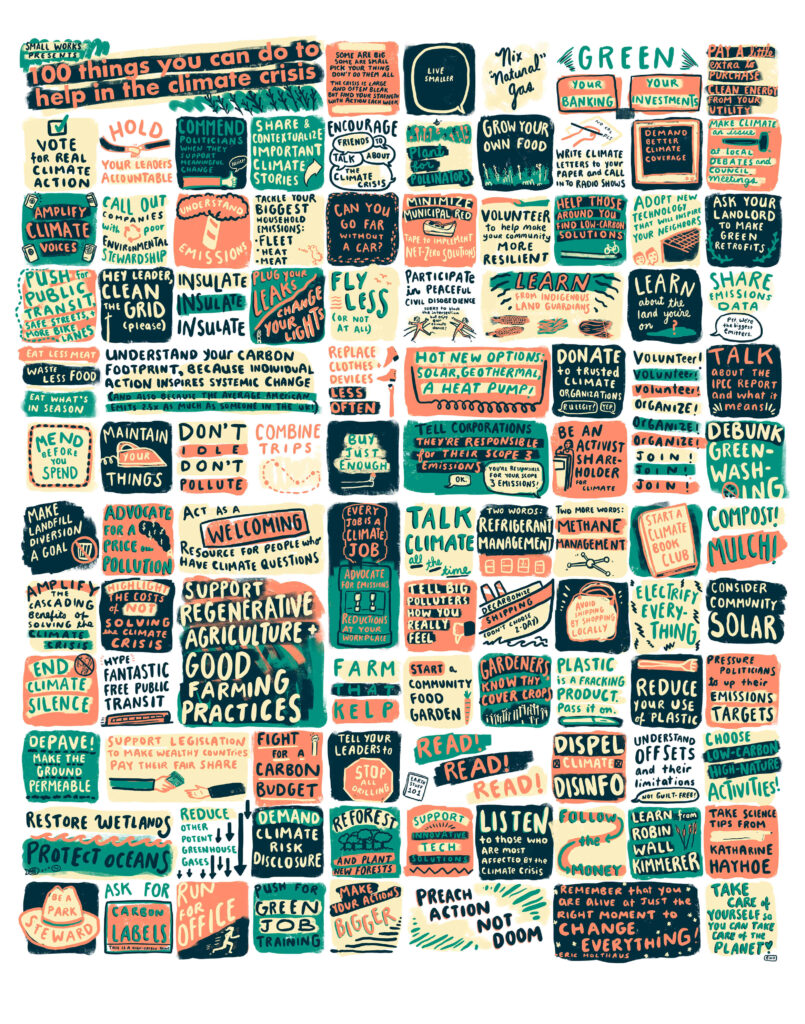Every self-respecting climate-friendly, sustainability website has its list of things to do, and this is ours! Being eco doesn’t need to be expensive, in fact there are lots of ways you can save money and be more climate-friendly. Here are the top changes you can make to live more sustainably.
- Watch what you eat
- Eat more vegetable and pulses – not only are they incredibly good for you, but their farming has a lower impact on the environment than farming meats.
- Reduce your food’s air miles and other infrastructure costs by eating food that is grown or reared in your region and is seasonal so it doesn’t need to be imported. Search for recipes online or books like Jane Grigson’s Vegetable Book and Fruit Book and seasonal cookbooks like Anna Jones’ A Modern Cook’s Year have great ideas.
- Find clever ways to use what you’ve got in the fridge, so nothing gets thrown out – you’ll be saving money as well the environment. https://lovefoodhatewaste.com offers tips and recipes to reduce waste.
- Eat with friends and family – cooking bigger meals for more people means more efficient cooking.
- Reduce the energy you use, by allowing food to cool before putting it in the fridge, or defrosting it in the fridge before cooking it.
- This one is only for the brave: intermittent fasting. If you only eat 5 days out of 7, then your impact is reduced by 2/7ths. Plus of course there are health reasons to do it.
- Save money by saving energy
- Get your energy company to fit a smartmeter, it will really help you to identify where you are using energy and spending money you don’t need to.
- Only have the hot water on when you need it, e.g. for your shower in the morning and evening, and turn its temperature on your boiler down to 60°C.
- Do the same for your central heating with the room temperature thermostat, and turn down the circulating temperature of the water on the boiler.
- Stop all your lovely heat escaping by ensuring windows are closed, unused chimneys are blocked and windows and external doors are draught-proofed.
- Excess humidity from bathrooms, kitchen and laundry can cause damp and mould, which are traditionally fixed by draught vents allowing cold air in. It can be cheaper to run a dehumidifier in winter as it keeps the warm air in and even warms it up more, allowing heating to be turned down in the rooms concerned.
- Make some practical changes in your home
- There are lots of relatively cheap and simple changes you can make, as well as some longer-term investments.
- Fit thermostatic control valves on individual radiators, turn radiators off in rooms you don’t use.
- Replace traditional bulbs with LED low energy lights (this is a favourite freebie from energy providers and councils, so check if you can get it free before spending money)
- Fit sensor lighting externally and in communal areas, that automatically turn off when the area is not in use.
- Insulate your hot water cylinder if you have one.
- Ensure your plumber puts anti-corrosion compound in the heating system. Otherwise gas and sludge will build up and reduce heating efficiency (this can be expensive to sort out if ignored involving a powerflush and bleeding your radiators).
- Upgrading your appliances unnecessarily wastes resources, but when you need to change them, choose the most energy efficient possible – look for appliances with an A+++ rating.
- Make sure your home is well insulated, including breathable insulation in the loft, double glazing and insulating walls and floors.
- Consider replacing your gas boiler with a more eco alternative such as a ground source heat pump, air source heat pump, immersion heater, solar hot water.
- Change your energy provider to a renewable energy company – but beware of providers making exaggerated claims, or relying extensively on carbon offsetting to ‘balance’ their CO2 emissions. You can find a comparison of green energy suppliers here.
- Reduce the impact of your travel
- Leave the car at home and take the train, bus or – best of all – cycle or walk. This doesn’t have to be all nothing, reduce your car use where you can.
- Fly less – start by making one leg of your journey by train or ferry, or go full on and make the journey the destination
- The website the Man in Seat 61 makes it simple to plan and book trips to destinations all over the world whilst reducing your carbon footprint.
- To fly long-haul less, stay longer but visit less often, combine it with working remotely and choose truly sustainable hosts
- Ensure your money is used wisely
- Lots of banks help finance the fossil fuel industry, including Barclays, HSBC, First Direct, M&S Money, NatWest, RBS, Coutts, Lloyds, Halifax, Bank of Scotland, Santander, Cater Allen, Tesco or Citigroup. Switch your account to a bank that is committed to green investments – for example Triodos or the Co-operative Bank (although the Co-operative Bank provides free banking, it has not scored well with Which? for practical reasons.)
- Pension funds also often provide financial services to companies that are harmful to the environment. If you are paying into a pension fund, why not look for an ethical pension. For example, Nest is a not-for-profit pension company with carbon divestment policies that provides workplace pensions. Royal London is a high-scoring mutual providing personal pensions and Abundance Investments provides SIPPs.
- Re-use, recycle, repair, buy used
- Help create a circular economy where items people no longer want are reused – why? See the Story of Stuff on YouTube
- You can find what you need or post things you no longer want on Freecycle, Freegle, Nextdoor and the Tufnell Park Parents Support Group web site.
- For mending see the Tufnell Park Parents magazine recommendations pages, or learn to do it yourself, e.g. with WikiHow videos.
- Be aware of what you wear
- Fast fashion and clothing in general is incredibly resource intensive (watch Stacey Dooley on Fashion’s Dirty Secrets if you don’t believe us!)
- Vintage is best, but if you’re buying new, make sure the clothes are natural fibre, or even better, natural, organically farmed fibre.
- Some good sources are:
- www.howies.co.uk
- www.nudiejeans.com (which will also do repairs)
- https://communityclothing.co.uk
- https://www.fatface.com
- https://www.gossypium.co.uk
- https://www.peopletree.co.uk
- https://www.spiritofnature.co.uk
- https://www.naturalcollection.com
- https://www.bambooclothing.co.uk
- https://www.skinniesuk.com
- https://www.missmary.co.uk
- https://www.gingerlily.co.uk
- https://www.greenfibres.com
- https://www.ecooutfitters.co.uk
- https://www.nomadsclothing.com
- check out the Third Estate shop on Brecknock Road N7
- see https://www.theguardian.com for ethical brands
- Make your voice heard
- Email or write to your local MP, councillor or other elected official – website www.writetothem.com makes it simple by letting you search by postcode then providing links to the right people.
- ESG (Environment, Society and Governance) is a legal requirement for listed companies. Find out who your company’s lead for ESG is and ask them how you can get involved.
- Sign and share pro-climate petitions you see online
- Keep your eyes wide open
- Sadly some bad actors in business and politics want to keep our fossil fuel economy just the way it is. They are running well-funded disinformation campaigns to keep us thinking we needn’t take action or that it can be done in baby steps.
- How does being aware of climate disinformation make us more sustainable, or lower our carbon footprint? Well, it doesn’t change us, but our efforts will be worth nothing if everybody else is persuaded by the disinformation.
- The risks of severe damage to society and the economy are mounting all the time. We must stop global warming and that means rapid, robust changes to what we do and how we do it. People won’t accept it if they believe it’s not justified, so always double-check someone is not just repeating misinformation and fake news when you hear something that doesn’t sound right.
- Do not despair though. Humanity can do this. It’s called the New Climate War and it is being fought on social media.
- For a run-down on the social dilemma, read Corrupt Algorithms: Climate Denial on Facebook
- Look after Nature
- It might be more difficult to quantify what impact we’re having when we protect or restore nature, but it is still hugely important that we become more sustainable and eco-friendly in all our choices.
- We need to keep our gardens and local green spaces green and thriving with biodiversity.
- We need to get back to Nature when we go on holiday, choosing those green, eco-friendly destinations that don’t get as much advertising as they should.
- Supply chains that we support with our purchases can cause the destruction of natural bogs, grasslands, woodlands, kelp forests or seagrass meadows. These conversions end up causing immense CO2 emissions, whether in suburban England or tropical Amazonia.

